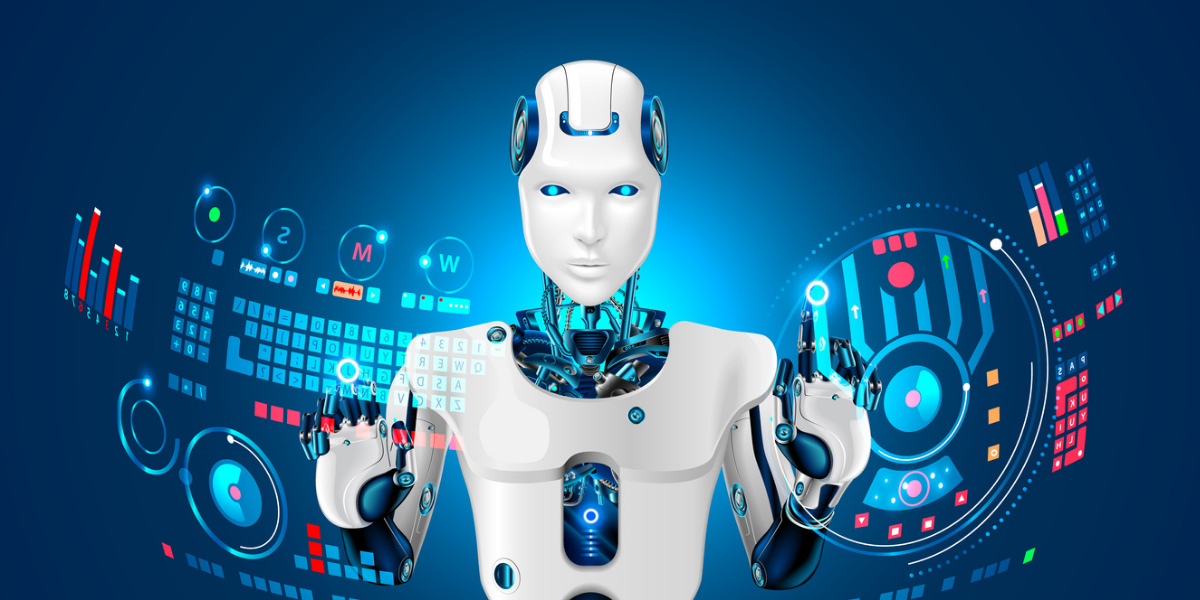
How Is AI Marketing Implemented And What Does It Mean?
- By Sahil Gupta
- 29-01-2024
- Artificial Intelligence
Artificial intelligence (AI) has emerged as a driving force in a variety of sectors, transforming company processes and increasing efficiency. AI has found a critical position in marketing due to its capacity to analyze massive volumes of data and generate significant insights. AI marketing, also known as AI-powered marketing, uses the power of artificial intelligence (AI) technology to optimize marketing tactics, improve customer experiences, and drive corporate success.
Businesses may better understand their target audience, forecast consumer behavior, customize marketing efforts, and automate repetitive operations by employing AI algorithms and machine learning techniques. AI marketing allows marketers to make data-driven decisions, enhance targeting accuracy, and offer more relevant content to customers, resulting in improved customer engagement and conversion rates.
What exactly is AI Marketing?
AI marketing, also known as AI-powered marketing, employs artificial intelligence technology and algorithms to improve marketing tactics, enhance consumer experiences, and drive corporate development. It entails utilizing artificial intelligence skills to analyze massive amounts of data, derive important insights, automate activities, and customize marketing efforts.
Machine learning, natural language processing, data analytics, and predictive modeling are used in AI marketing to improve consumer segmentation, targeting, content development, campaign optimization, and customer relationship management. Marketers may use AI to make data-driven choices, automate laborious activities, offer customized content, and increase overall marketing performance.
Is AI marketing legitimate? is the question that plagues everyone in the marketing industry. AI marketing is legitimate, yes.
It entails utilizing AI technology to improve and maximize marketing campaigns and tactics. AI has been effectively incorporated into marketing campaigns by several companies and organizations, improving data analysis, tailored experiences, consumer targeting, and overall campaign performance.
AI has a well-established track record of success in marketing, with a wide range of uses including chatbots, predictive analytics, content suggestions, and consumer segmentation. But it's critical to distinguish between legitimate AI marketing platforms and tools and others that could make erroneous promises. When choosing and using AI solutions in marketing, due diligence is essential, just as with any other technology or product.
The following are important AI marketing components:
- Data Analysis: AI algorithms are capable of analyzing large amounts of client data, including demographics, browsing activity, purchase history, and social media interactions. This study aids in the identification of patterns, trends, and client preferences, allowing marketers to better understand their target audience.
- Personalization: Artificial intelligence helps marketers provide personalized experiences to individual consumers by adapting information, recommendations, and offers to their tastes and habits. The level of personalization boosts conversion rates and customer engagement.
- Automation: AI automates time-consuming and repetitive operations like data input, report production, and campaign optimization. This automation frees up time for marketers, allowing them to focus on strategic goals and creative marketing features.
- AI algorithms: it can forecast future consumer behavior, such as purchase probabilities, churn rates, and campaign success. These predictive insights assist marketers in optimizing their strategy, effectively allocating resources, and maximizing ROI.
- Customer Service: AI-powered chatbots and virtual assistants give real-time customer service, answer questions, and make tailored suggestions. They imitate human-like discussions, delivering 24-hour support and increasing overall client satisfaction.
- Material Generation: Using specified rules and algorithms, AI may produce material such as product descriptions, blog entries, and social media captions. This content generation aids with the streamlining and uniformity of content-generating operations.
Why is AI Marketing so important?
AI marketing is critical for several reasons:
Automation
AI-powered marketing automates time-consuming and repetitive operations like data analysis, content creation, and campaign optimization. This frees up marketers' time, allowing them to concentrate on strategic goals and creative marketing components.
Error Minimization
AI algorithms are meant to analyze massive amounts of data accurately and consistently. AI marketing contributes to more dependable and exact outcomes by minimizing human error in data analysis and decision-making processes.
Savings on expenses
By automating operations that would normally need manual labor, AI marketing can result in considerable cost reductions. It eliminates the need for large marketing teams and streamlines operations, enhancing resource allocation and efficiency.
Increased Return on Investment
The capacity of artificial intelligence (AI) to analyze massive volumes of consumer data and generate actionable insights assists marketers in making educated decisions and optimizing marketing strategies. By recognizing the most successful techniques, targeting the correct audience, and allocating money efficiently, AI marketing may improve return on investment.
Increased Customization
Individual client data may be analyzed by AI systems to provide tailored experiences across various marketing channels. By offering individualized content, recommendations, and offers, AI marketing improves client engagement, satisfaction, and loyalty.
Decision Making that is Smarter and Faster-
AI marketing gives marketers real-time insights and predictive analytics, allowing them to make data-driven decisions swiftly. Marketers can respond more agilely and proactively to market developments, trends, and consumer behaviors thanks to AI's capacity to swiftly process and analyze enormous data volumes.
AI Marketing Difficulties
There are hurdles associated with using AI marketing, just like any other technology. Among the main obstacles facing AI marketing are:
Achieving Organizational Support
Key organizational stakeholders must support and buy into the use of AI marketing. It could entail changing one's perspective and getting over aversion to change. Gaining organizational buy-in requires resolving concerns, educating decision-makers about the advantages of AI marketing, and showcasing the possible return on investment.
Handling Deployment Problems
It can be difficult to deploy AI marketing solutions, particularly when combining them with already-in-place systems and procedures. It calls for meticulous organization, technological know-how, and preparation. Compatibility issues, data integration issues, system scalability issues, and handling the shift from human to automated operations can all present challenges.
Data Accessibility and Quality
For AI algorithms to produce precise insights and forecasts, they require high-quality, pertinent data. On the other hand, companies can want assistance with data availability, completeness, and quality. Biased or inconsistent data might result in erroneous conclusions and analysis. To guarantee dependable AI-driven marketing tactics, marketers must engage in data management procedures, data cleansing, and data enrichment.
Training and Skill Deficits
AI marketing implementation calls for qualified experts who comprehend both AI technology and marketing concepts. On the other hand, personnel with experience in AI and data analytics is scarce. Employers may have trouble finding and preparing workers with the necessary skill sets to use AI marketing platforms and products efficiently.
Use of AI in Ethics
AI marketing brings up ethical issues, especially regarding algorithmic bias, customization, and data exploitation. Marketers need to be aware of the possibility of prejudice, unforeseen repercussions, and privacy violations. It is crucial to set up moral standards and procedures that emphasize justice, openness, and responsible AI application.
A comprehensive strategy that includes coordinating stakeholders, making training and infrastructure investments, putting in place strong data governance procedures, and abiding by ethical standards is needed to address these issues. Through early resolution of these issues, companies may harness the promise of AI marketing while reducing associated hazards.
Artificial Intelligence's Place in Marketing
Artificial Intelligence plays a significant and diverse role in marketing. It gives advertisers the ability to:
Obtain Knowledge
Through the extraction of valuable insights from massive data sets, artificial intelligence (AI) empowers marketers to recognize market trends, comprehend consumer preferences, and make well-informed choices.
Enhance focusing
To precisely segment audiences and offer tailored content, AI algorithms evaluate consumer data. This improves targeting accuracy and improves the customer experience.
Automate operations: AI saves time and frees up marketers to concentrate on strategic projects by automating repetitive operations like data input, report production, and campaign optimization.
Boost Customer Engagement
Artificial intelligence (AI) makes it possible for chatbots, virtual assistants, and tailored interactions to provide smooth and interesting customer experiences across a variety of touchpoints.
Examples of AI in Marketing in Real Time
AI is fundamentally changing marketing tactics in several different sectors. Businesses can enhance advertising, provide individualized experiences, and obtain insightful data about client behavior by utilizing AI technology. Here are a few current instances of AI being used in marketing:
Nike: AI-driven Customization and Product Suggestions
Nike uses artificial intelligence (AI) systems to evaluate consumer data and offer tailored experiences and suggestions on their website. They create product recommendations, provide personalized content, and utilize AI to comprehend user preferences to improve the online experience for their customers.
Amazon: A Personalized Shopping Experience Powered by AI
To give tailored product recommendations, Amazon's recommendation engine analyzes user activity, past purchases, and browsing habits using AI algorithms. The chance of conversions and customer satisfaction is increased as a result of these recommendations, which are based on comparable consumer profiles and preferences.
Alibaba: A Fashion Retail Experience Enhanced by AI
AI technology is integrated into Alibaba's Fashion AI store in Hong Kong to improve the shopping experience. Consumers may try on clothing, and AI-enabled mirrors provide them with fast style advice and recommendations according to their body type, tastes, and the newest trends in fashion.
BMW - Intelligent Personal Assistant for Better Driving
BMW has unveiled the Intelligent Personal Assistant, an AI-powered virtual assistant. It interacts with drivers and provides tailored driving experiences by utilizing natural language processing and machine learning. The assistant may handle in-car systems, aid with navigation, and make recommendations depending on the tastes and habits of the driver.
Starbucks
Starbucks has launched an AI-powered rewards program and a mobile app. Starbucks uses artificial intelligence in its mobile app and rewards program. To provide tailored suggestions, incentives, and rewards, the app analyzes client data, purchase history, and preferences. It also utilizes location-based data to recommend nearby establishments and deliver clients personalized offers.
Netflix
If you work in marketing, you are aware that the appropriate message needs to be sent at the right moment to the right individual. Netflix does this with AI. How?
The Netflix tech blog details how the firm determines the artwork for suggested movies or TV episodes based on past viewing behavior.
For instance, if you've seen a lot of one actor's films, they could suggest a different one. You could, however, click away if the actor isn't highlighted in the artwork. Hence, the poster will include that actor if the film is suggested for this particular viewer.
These illustrations show how artificial intelligence (AI) may be applied to marketing to boost engagement, improve consumer experiences, and increase customization. These businesses may provide personalized content, recommendations, and experiences that speak to specific consumers by utilizing AI technology. This increases customer happiness and loyalty and eventually boosts business development.
AI Development Costs
The complexity, scale, and level of customization all affect how much an AI system costs to build. Creating an AI marketing system requires funding for qualified personnel, infrastructure for data collecting and analysis, the creation of AI algorithms, and continuous upkeep. Nonetheless, the long-term advantages—such as enhanced customer satisfaction, better productivity, and expanded income potential—often surpass the initial outlay.
AI's Role in Marketing in the Future
As companies continue to leverage AI technology to better their marketing strategies, the field of artificial intelligence in marketing has enormous promise. Marketers should anticipate even more sophisticated personalization, more consumer engagement, and higher targeting accuracy with the continuous improvements in AI algorithms and data analytics.
Artificial intelligence (AI) will remain essential for automating monotonous operations, delivering real-time insights, and expediting decision-making procedures. AI-driven predictive analytics will get more precise as companies gather and evaluate more data, giving marketers the ability to precisely predict the wants and needs of their target audience.
According to Grand View Research, by 2030, the global AI industry is expected to reach an estimated $1,811.8 billion. From $136.6 billion in 2022, that is a considerable increase. It follows that it is understandable how quickly AI is applied to new domains and scenarios.
Even though AI marketing has many advantages, data privacy and ethical issues will always be important. Businesses need to stress justice, openness, and ethical data usage as AI technologies become more commonplace to keep customers' confidence.
All things considered, AI's future in marketing seems bright, and companies that use AI-driven tactics will be at a competitive advantage when it comes to providing individualized experiences, maximizing marketing budgets, and cultivating client loyalty.
Recent blog

Harnessing Social Media: Tactics For Powerful Marketing Success Achievement
Social Media | 25-07-2024
7 Hidden Secrets of MSI Laptop Boot Menu Key
Technology | 24-07-2024




